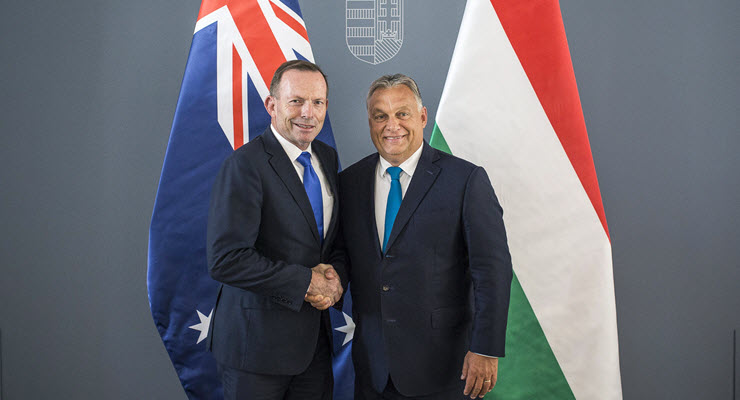
“A leader who deals in hateful anti-Semitic tropes.” That’s how Politico describes Hungarian Prime Minister Viktor Orbán.
Earlier this month, The Age and The Sydney Morning Herald published Michael Koziol’s account of the remarkable ties between Orbán and Australian conservative luminaries. Tony Abbott, of course, attended a Hungarian demography conference in September as a guest of honour and used the occasion to praise his host for standing up against refugees, and warn of migrants “swarming across the borders in Europe”. Abbott was joined at the conference by fellow conservative backbencher Kevin Andrews.
Then there’s former foreign minister Alexander Downer who, at a similar event earlier in the year, attacked immigrants in Australia for setting up “separate ghettos” and living “Bantustan-style” life.
Koziol also noted the role played by Mark Higgie, Abbott’s former international affairs adviser, at an outfit called the Danube Institute, where he works alongside John O’Sullivan, the former editor (and current international editor) of the “wildly conservative” Quadrant magazine. The Danube Institute, says Koziol, “has become a pit-stop for conservative intellectuals on tour from Australia”.
What was particularly interesting about Koziol’s piece was the reaction — there wasn’t one. Or, at least, not one on the scale you might expect.
Notoriously, in 2017 Orbán’s government distributed thousands of posters showing the grinning face of Jewish billionaire and philanthropist George Soros with the slogan “let’s not allow Soros to have the last laugh”. More than half a million Hungarian Jews were killed during the Holocaust, but today, according to recent surveys, 42% of Hungarians believe Jews have too much influence.
Unsurprisingly, many of the posters were immediately supplemented with racist graffiti. Yet he returned to the trope again this year, portraying Soros alongside European Commission President Jean-Claude Juncker with the caption “You also have the right to know what Brussels is preparing for!”
Had Greens MPs or trade unionists been caught associating with a politician who traffics in stereotypes about Jewish financiers, Australia’s conservative media would have been — quite rightly — incandescent with rage. Why, then, haven’t the Liberals been pursued with the same ferocity over Orbán’s Australian cheer squad? The answer illuminates something about the evolution of modern racism.
Orbán is an unabashed ethno-chauvinist who openly seeks to maintain ethnic homogeneity on the basis that “life has proven that too much mixing causes trouble”. Even while attacking Muslims and Africans as a Soros-inspired existential menace, Orbán explains that Hungary would “let in true refugees: Germans, Dutch, French and Italians … who here in Hungary want to find the Europe they have lost in their homelands”.
On that basis, he can praise Miklós Horthy — who presided over the wartime killing of Jews — and the anti-Semite Bálint Hóman, even while forging a close relationship with the Israeli Prime Minister Benjamin Netanyahu. He directs his ire not at nationalists like Netanyahu but at “globalists” and “cosmopolitans”. Hungary’s enemies, Orbán has said, “do not believe in work, but speculate with money; they have no homeland, but feel that the whole world is theirs”. Again, that’s an old-fashioned anti-Semitic trope — but it’s obviously not relevant to Netanyahu, who constantly proclaims the importance of an ethnic homeland.
For his part, Netanyahu, obsessed with the demographic threat from Palestinians, sees much to admire in Orbán’s ethnically-focussed nationalism, as well as the Hungarian leader’s disdain for Muslims. As Israeli newspaper Haaretz has written, “the parallels between Benjamin Netanyahu and Orbán are breathtaking”.
That’s why the Israeli regime has repeatedly shown a willingness to defend Orbán against his critics. During the international backlash against the Soros immigration posters, Israel’s ambassador to Hungary initially condemned the campaign as one that “sows hatred and fear” — and then, hours later, issued a second statement explaining that “in no way was the statement [by the ambassador] meant to delegitimise criticism of George Soros”. The next year Netanyahu welcomed a visit by Orbán, hailing him as a “true friend of Israel” who understood that “the threat of radical Islam is a real one”.
Last week, a young man who describes himself as a Holocaust denier tried to attack a synagogue in the German city of Halle. When he couldn’t break in, he killed a Muslim man in a kebab shop. It was a hideous reminder of how Islamophobia and anti-Semitism reinforce each other, with deadly effects. The Halle killer was, after all, inspired by the Australian fascist who murdered 51 people in two mosques in Christchurch.
That’s something to bear in mind as, with Scott Morrison now excoriating “negative globalism”, we see more local conservatives taking their cues from Hungary.








I guess that when you’re looking at the world through a couple of holes in a sheet you can’t see a bigger picture : like who or what might actually be to blame for the lamentable state in which you think you’re in.
That these sacrificial expendable scapegoats offered up (by those that don’t want to be scrutinised too closely) might not be to blame?
Outrage is, of course, the preserve of the far-right, Sky after Dark and The Spectator. However, it is reserved for those horrible lefties, not their own; so it doesn’t matter what racist, homophobic, ignorant or completely false utterances are made it passes without comment or criticism.
Speaking of Scomo’s negative globalism . I’m looking forward to his National Security Border Force protecting our drowning brown blistering land of golden opportunities against the intrusive alien invasion of AGW & CC..
Fascists of a feather stick together.
You know … like lumps of dog poo on your shoe.
Crikey – KKK and dog shit references in the same set of comments ..!!!
That will have some of the RWNJ’s howling with righteous indignation….but extremely apt in both cases.
And not a peep from Colin Rubenstein or even Treasurer Frydenberg?
That is exactly what I was thinking – perhaps they are too busy working on the reintroduction of the ‘Jerusalem’ plan!